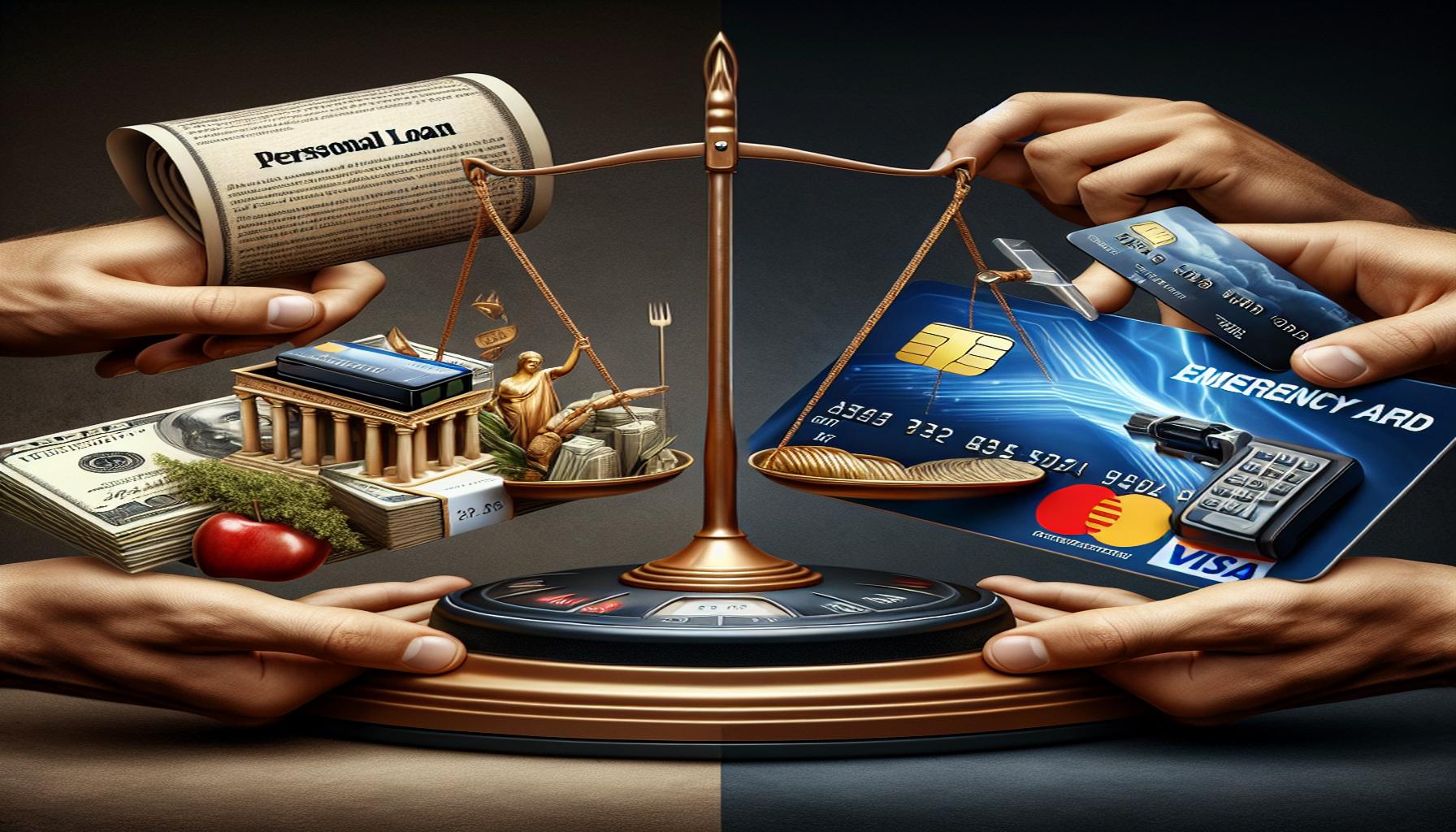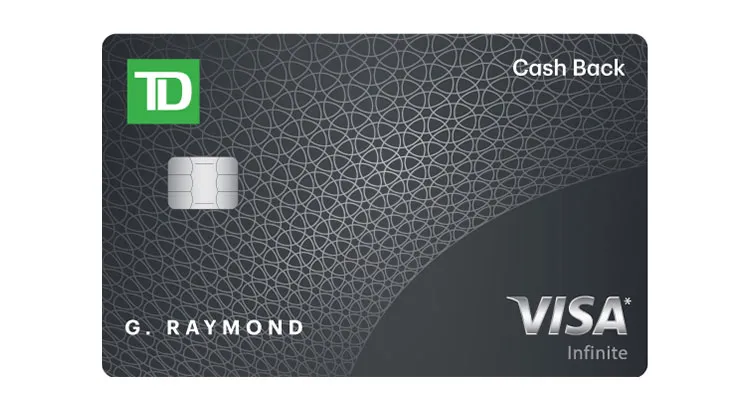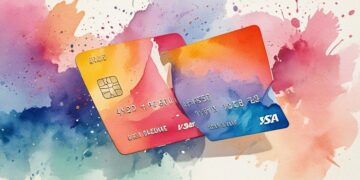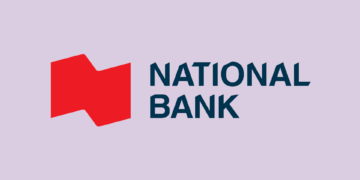Personal loan or credit card: which is the better option in emergencies

Emergency Financial Options Explained
Emergencies can strike at any moment, whether it’s a sudden car repair, an unexpected medical bill, or urgent home repairs. Having the ability to respond swiftly in these situations is vital. When looking for ways to access funds quickly, two common options arise: personal loans and credit cards.
While both choices can provide immediate financial relief, they operate quite differently and have distinct implications. Understanding these distinctions is key to selecting the option that will serve you best in times of need.
Access to Funds
One of the primary benefits of credit cards is immediate access. If you already have a credit card, you can tap into your available credit limit right away. For example, if you have a credit limit of $5,000 and you need $1,000 for car repairs, you can simply use your card to pay for the repairs, making it a convenient option in unexpected situations.
On the other hand, obtaining a personal loan typically involves an application process that can take anywhere from a few hours to several days, depending on the lender’s process. While some lenders offer same-day approvals, it’s generally not as fast as using a credit card. For example, if your car breaks down on a Friday evening and you need funds immediately, a credit card might be your best bet since you can use it right away, whereas a personal loan might not align with your timing.
Interest Rates
When it comes to interest rates, personal loans usually have a significant advantage. They often feature lower interest rates compared to credit cards, particularly for borrowers with good credit scores. For instance, a person with an excellent credit rating might secure a personal loan at an interest rate of around 6%, while credit cards can have rates exceeding 20%.
This difference can significantly impact your finances in the long run. If you were to take out a $5,000 personal loan at 6% interest over three years, your monthly payment would be manageable. Conversely, if you were to put that same amount on a credit card with a 20% interest rate and only make minimum payments, it could take years to pay off and end up costing you much more.
Repayment Terms
Another critical aspect to consider is the repayment terms. Credit cards typically require monthly minimum payments, which can lead to a prolonged repayment period, especially if you only pay the minimum amount. Personal loans, however, come with fixed installments that span several months or years, providing a clear timetable for when you will be debt-free.
For example, if you take out a personal loan of $10,000 with a three-year term, you’ll know exactly how much you need to pay each month. This predictability can help you plan your finances more effectively, making it easier to budget your monthly expenses without the uncertainty that can come with credit card debt.
In conclusion, understanding the nuances between personal loans and credit cards can empower you to make informed choices during financial emergencies. By weighing the benefits and drawbacks of each option, you can decide which solution aligns best with your unique circumstances, ensuring your financial stability when it matters most.
Comparing Quick Financial Solutions
Choosing between a personal loan and a credit card during an emergency requires a good understanding of each option’s features. Aside from access to funds and interest rates, there are other critical factors to consider that can greatly impact your financial health during tough times.
Credit Score Impact
Your credit score plays a crucial role in both personal loans and credit cards. For personal loans, lenders assess your credit history to determine your eligibility and interest rate. A higher score can lead to lower rates and better terms. In Canada, most personal loans are structured with fixed repayment plans, which can help improve your credit score as you make on-time payments.
Conversely, while utilizing a credit card can also impact your score, it does so in different ways. If you carry a high balance relative to your credit limit—known as your credit utilization ratio—your score can drop. Ideally, you should aim to keep this ratio below 30%. Regularly maxing out your credit card, especially in emergencies, can have lasting negative effects on your credit health.
Loan Amounts
The amount of money you can access differs significantly between these two options. Credit cards usually come with predefined limits based on your creditworthiness. For example, if your credit limit is $3,000 and you face a $1,200 car repair, you might be able to cover it. However, if you need a larger sum, say $10,000 for unexpected medical expenses, a personal loan could be more beneficial. Personal loans typically range from $1,000 to $50,000, offering more flexibility in cases of larger emergencies.
Usage Flexibility
Another important consideration is how you can use the funds. With a credit card, the funds are primarily meant for purchases, making it suitable for direct payments. However, if you incur a debt, like a medical bill, and you need cash urgently, a personal loan may be the better option as the funds can be directly deposited into your bank account. This gives you the flexibility to pay for various expenses or to cover urgent bills that may not be accepted by a credit card.
Factors to Weigh
- Purpose of the Loan: Understand whether your emergency requires immediate spending or if you need time to pay for something.
- Repayment Capability: Assess your monthly budget to see which option fits better into your financial plan.
- Interest Rate Considerations: Calculate how much interest you’ll incur on both options before making your choice.
- Potential Impact on Credit Score: Consider how each option may affect your long-term credit health.
In evaluating these various features, you can gain a clearer picture of which emergency financial solution aligns best with your needs. Understanding the implications of each choice will enable you to make an informed decision that can alleviate financial stress during unpredictable situations.
Evaluating Long-term Consequences
While it might be tempting to focus solely on immediate financial relief when faced with an emergency, it’s essential to consider the long-term implications of both personal loans and credit cards. The decision you make can affect not only your current financial situation but also your future borrowing capabilities and overall financial health.
Debt Management and Repayment Terms
One critical aspect of managing debt is understanding repayment terms. Personal loans typically come with fixed monthly payments, which can make budgeting more manageable. For example, if you take out a personal loan of $5,000 with a 10% interest rate over a three-year term, you would have predictable payments each month, making it easier to plan your finances.
In contrast, credit cards operate on a revolving credit system, which can create a more complex repayment landscape. While you may not be required to pay off your entire balance each month, only making the minimum payment can lead to extending your debt period and accumulating more interest. As interest rates on credit cards can be quite high—often exceeding 20%—this can quickly lead to a debt spiral if you’re not cautious. Understanding the characteristics of how you will pay off your debt is crucial for both options.
Emergency Preparedness
Another factor to reflect on is your overall financial preparedness for emergencies. Having access to a credit card can serve as a safety net in many scenarios, enabling you to address urgent financial needs as they arise. However, if you’re continuously relying on credit card debt without a repayment plan, this could lead to increased stress and potential financial complications in the future.
On the other hand, opting for a personal loan can sometimes foster a more responsible approach to emergencies. It encourages you to carefully consider the amount you need and can allow you to avoid the temptation of ongoing credit card debt. Furthermore, obtaining and successfully repaying a personal loan can enhance your credit history and improve your loan eligibility in the future.
Potential Fees and Penalties
When evaluating which option is better, it’s vital to consider fees and penalties that may apply. Credit cards often come with various fees, such as late payment fees or cash advance fees, which can add up quickly if you’re not diligent. An unexpected cash advance may seem convenient in the moment but could result in excessive costs.
Similarly, personal loans may entail origination fees or prepayment penalties that could affect the overall cost of borrowing. It’s essential to read the terms and conditions thoroughly before committing to either option to ensure you understand the total cost of your debt and any potential fees.
Choosing Wisely Based on Lifestyle
Your lifestyle and spending habits can play a significant role in deciding between a credit card and a personal loan for emergencies. If you tend to maintain a low balance and can pay off your credit card each month, using it may not be a problem. However, if you struggle with credit card debt, a personal loan could offer a more structured way to handle financial emergencies.
In summary, take the time to evaluate how both personal loans and credit cards align with your financial situation and goals. Being informed will empower you to make decisions that not only address your immediate needs but also contribute positively to your financial future.
Conclusion
When it comes to navigating financial emergencies, both personal loans and credit cards have their unique advantages and disadvantages. Understanding these differences can empower you to make informed decisions tailored to your individual circumstances. Personal loans offer structured repayment plans with fixed monthly payments, which can make it easier to manage your budget over time. They tend to have lower interest rates compared to credit cards, making them a better choice for significant expenses, like medical bills or home repairs. Moreover, successfully repaying a personal loan can enhance your credit profile, potentially paving the way for better borrowing opportunities in the future.
On the other hand, credit cards provide immediate access to funds, serving as a convenient safety net during urgent situations. Their flexibility can be beneficial, especially if you can pay off the balance quickly to avoid high-interest charges. However, it’s crucial to be cautious; failing to manage credit card debt responsibly can result in escalating financial burdens due to high interest rates and hidden fees.
Ultimately, the better option depends on several factors, including the size of the emergency, your current financial health, and your ability to manage repayments. Assessing your unique situation alongside your lifestyle and spending habits can guide you in selecting the right tool for financial support. Remember that being proactive—whether that means building an emergency fund or improving your credit score—can go a long way in preparing you for unexpected events in the future. Take the time to weigh your options carefully, and choose the path that best aligns with your personal financial goals.

Linda Carter is a writer and financial consultant specializing in economics, personal finance, and investment strategies. With years of experience helping individuals and businesses make complex financial decisions, Linda provides practical analyses and guidance on the World Information Now platform. Her goal is to empower readers with the knowledge needed to achieve financial success.






